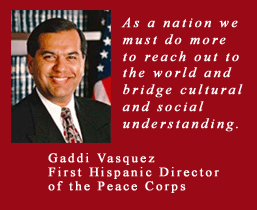 |
|

|
|
10 REASONS FOR
HISPANIC-AMERICAN STUDENTS
TO STUDY ABROAD
Hispanic cultures have always had a major
influence on shaping of the United States, especially with increased
immigration from Latin America in recent decades. According to the
U.S. Census Bureau in 2002, more than one in eight people in the
United States were of Hispanic origin. The Census Bureau also
predicts that by the year 2100, ethnic minority groups in the United
States will make up 60 percent of our country’s population, with the
vast majority being Latino.
 Just as the face of America is rapidly changing, it is becoming
increasingly important for students in the U.S. to travel and study
in other countries. Gaddi Vasquez, the first Hispanic Director of
the Peace Corps, described an experience he had in Morocco when a
man told him he didn’t look like an American because of “…the color
of your skin. You don't look like an American.” Vasquez said that
encounter “gave me the opportunity to talk about how my grandparents
had come to the United States from Mexico, and how we had become
part of the great fabric that makes our nation strong.” Studying
abroad is an amazing opportunity to showcase the great diversity
that makes up the United States. Just as the face of America is rapidly changing, it is becoming
increasingly important for students in the U.S. to travel and study
in other countries. Gaddi Vasquez, the first Hispanic Director of
the Peace Corps, described an experience he had in Morocco when a
man told him he didn’t look like an American because of “…the color
of your skin. You don't look like an American.” Vasquez said that
encounter “gave me the opportunity to talk about how my grandparents
had come to the United States from Mexico, and how we had become
part of the great fabric that makes our nation strong.” Studying
abroad is an amazing opportunity to showcase the great diversity
that makes up the United States.
Additionally, the chance to live and study in another culture will
provide you with the ultimate learning experience, as well as the
perfect opportunity for you to get out and explore the world. With
the realities of globalization today, the options Hispanic students
have for studying abroad are endless. Whether you decide on Paris or
Paraguay, Berlin or Bangladesh, Guatemala or Ghana, there are
countless reasons why you should participate in a study abroad
program. Here are our top ten….
 1. See the world and broaden your experience 1. See the world and broaden your experience
There are so many amazing things to experience around the world. You
can see different natural landscapes and climates that do not exist
in America. There are historical landmarks in every country that
helped shape the history of the globe. You can expand your knowledge
of the world by actually being there, seeing it, touching it, and
experiencing it. Pictures in text books simply do not do justice to
standing under the Eiffel Tower or on the Great Wall of China. Is
there a place or landmark you have always wanted to see? This is how
you can understand the world in a direct, all-encompassing way.
2. Gain a new perspective on your own country
In 1949, James Baldwin, the renowned African-American writer, wrote
in Notes of a Native Son, “From the vantage point of Europe [the
American student] discovers his own country.” Learning about your
own country by living abroad remains extremely relevant today as we
continue to further our understanding of other cultures. Of course,
studying abroad isn’t limited to Europe - you have the opportunity
to study in just about every corner of the globe. In Botswana or
Tanzania, Italy or Thailand, you will learn about the U.S. from a
new and different perspective. As a college student, there is no
better time to see the world and be exposed to new things. These
experiences will shape the rest of your life.
3. Explore your heritage
Getting in touch with your family’s heritage can be another strong
motivation to study abroad. Many minority students, particularly
Hispanic/Latinos, report tremendous educational and personal
benefits from exploring countries where their families have roots.
Whether your family recently emigrated to the U.S. or has lived here
for decades, and whether you are discovering your family’s culture
for the first time or interested in learning more, study abroad can
provide you with an opportunity to learn about your own ethnicity
and to explore your own identity. Many Hispanic students have
traveled to Latin America to get in touch with their heritage, and
have come back home with a new perspective on themselves as
Americans and as Hispanic-Americans.
 4. Improve your professional and financial potential 4. Improve your professional and financial potential
International experience is a critical and impressive part of any
resume. In addition to the personal growth you’ll undergo while
overseas, the international and cross-cultural skills you’ll develop
will certainly expand your employment opportunities and,
consequently, your income potential. Recognizing the link between
international experience and career success is critical in today’s
workplace. Globally-minded employees are in high demand. Many
companies seek out individuals with multi-lingual and multi-cultural
experience and skills. Many Hispanic/Latino students who study
abroad in Spanish speaking countries find that they are able to
build upon and improve their Spanish language skills, giving them an
instant advantage in the highly competitive workforce. Additionally,
students can also take advantage of internships while they study
abroad for an international work experience that is valued among
U.S. employers. Your newly acquired skills will strengthen your
resume in America’s increasingly ethnically and culturally diverse
workforce.
5. Become a full-time learner
While studying abroad you will have the opportunity to truly become
a full-time student. Traveling outside the United States will be an
education in itself. Many students who go abroad report that in
addition to enjoying and learning in their classes during the week,
they learn some of the most valuable lessons outside of the
classroom. Weekend excursions to museums and cultural sites also add
to your academic and personal growth. You learn to interact with
people who may not necessarily think or communicate like you. While
in a foreign country, even mundane activities – like shopping for
groceries –become educational experiences.
6. Gain new insights and outlooks through new relationships
The relationships formed while studying abroad might become some of
the deepest friendships you will ever develop. You will have the
opportunity to meet people from
 different backgrounds and cultures,
and some of these people may even become life-long friends. Study
abroad returnees often report meeting others with whom they expected
to have no common ground, and then discovering that, despite being
from different parts of the globe, they have much in common and much
to learn from one another. As a Hispanic student, you may also meet
other minority students similar to yourself who can share with you
their experiences and give you the support you need while living
abroad. These relationships, insights, and outlooks are a critical
part of the study abroad experience. different backgrounds and cultures,
and some of these people may even become life-long friends. Study
abroad returnees often report meeting others with whom they expected
to have no common ground, and then discovering that, despite being
from different parts of the globe, they have much in common and much
to learn from one another. As a Hispanic student, you may also meet
other minority students similar to yourself who can share with you
their experiences and give you the support you need while living
abroad. These relationships, insights, and outlooks are a critical
part of the study abroad experience.
7. Fight stereotypes by educating others
There is a challenge that many Hispanic students face abroad. Many
other cultures only have experience with Hispanics through the media
(i.e. music, movies, television, etc.). Hispanic-American students
may become frustrated when the same stereotypes from home follow
them overseas. However, this is also a unique opportunity to educate
others about who you are as an individual and as a group. You can
illustrate your own experiences in the United States in comparison
to what others see and hear. This is your chance to be an
individual, as well as a representative of your culture, and to
encourage positive understanding of global diversity.
8. Dispel your own stereotypes
Frederick Douglass, the renowned abolitionist of the 19th century,
once said “Men who travel should leave their prejudices at home.” In
addition to serving as a cultural ambassador to dispel other’s
misconceptions, studying abroad gives you a chance to break down
some of your own stereotypes about other countries and peoples. Not
only will you have the chance to immerse yourself in another
culture, you will also meet people from different backgrounds and
make personal connections with people whom you may have never
expected. If traveling to your family’s native country, you may be
surprised to find that you don’t in fact know everything about your
own culture – stereotypes you have about yourself and your culture
might be inaccurate!
9. Take control of your future
During your time abroad, you will be exposed to countless different
experiences that may influence the rest of your life. Some students
even end up changing their major or career path as a result of the new things they
learn from being abroad. Others discover a newfound passion for
travel, decide they want to work abroad, or desire to learn a new
language. The vast majority of study abroad students report feeling
more independent, self-confident, and knowledgeable of the world
around them. After studying abroad, you may find your travels have
had a profound influence on your career or personal goals. If you
wish to continue with your higher education into either a masters or
a doctorate, study abroad experience will give an edge on the
competition. Graduate programs, law schools, and med schools all
look favorably on such global experience. You never know who may be
impressed by your travels.
10. See what influenced these great Hispanic and Latino
leaders
A number of Hispanic- and Latino-Americans were strongly shaped by
their international experiences, including:
- Alberto R. Gonzales, U.S. Attorney General and the first Hispanic to
hold such high office in the U.S. government.
- Dr. Antonia Novello, the first Latin-American and first woman to be
appointed to the post of Surgeon General of the United States
- Geraldo Rivera, journalist and veteran foreign correspondent
- Gaddi H. Vasquez, first Hispanic Director of the Peace Corps
|
|
FEEDBACK? We'd like to hear from you.
OTHER REASONS? If you know of any other good reasons why
Hispanic-American students should study abroad, please email us at
 . .
OTHER FAMOUS HISPANIC-AMERICANS WHO STUDIED ABROAD?
If you know of any other famous Hispanic-Americans who have
studied abroad, please email us at  . . |
|

|
|
|